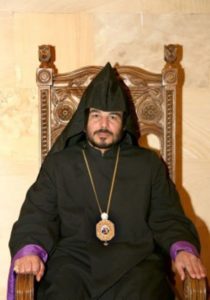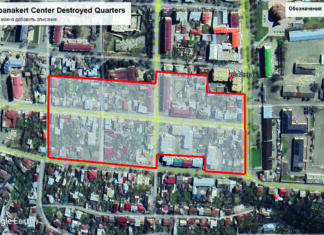YEREVAN — Dadivank still is not able to receive Armenian pilgrims and it is not known when pilgrims will be able to participate in the liturgy in the ancient monastery. The Primate of the Artsakh Diocese, Bishop Vrtanes Abrahamyan, told us that five Armenian clergymen continue to remain, isolated, in Dadivank: “Our five clergymen are always there. Only the pilgrims have not been able to enter since May. The clergy are there. They serve in a worthy way, in accordance with what is proper.”
The Primate is in touch with the five men, in spirit and by phone. There are also several dozen Russian peacekeepers with them in the area of Dadivank. Bishop Abrahamyan exclaimed: “They are our servants. The monks are in their monastic life. When it is necessary to visit Yerevan or Stepanakert, we permit it. They come, do their work and return, but they are always at their place of service. They do not have any contact with the Azerbaijanis. The clergy carry out all their activities with the peacekeepers.”
He stated that the purpose of the clergy is to pray, conduct services and celebrate liturgies. He remembers that at one time pilgrims used to visit the monastery, and baptisms and blessings were conducted.
Father Vrtanes does not know the reasons for banning the entry of pilgrims. Armenian pilgrims, for example, are able to visit Amaras Monastery accompanied by peacekeepers. Father Vrtanes noted that Amaras is not a forbidden zone. It is possible to enter with the peacekeepers and there is a liturgy every Sunday, unlike Dadivank, which is not considered part of the territory of Artsakh at the moment.
He said, “They do not permit it and that is it, without a reason. They do not say anything. The peacekeepers are in the territory of the monastery. They live together. Of course the rooms are different. They are separated: they are military, while the clergymen perform spiritual service. What the Azerbaijani side thinks is a secondary question. We are doing what we have to do.”
Tension is periodically observed at the borders of Armenia and Artsakh, and unfortunately, peaceful inhabitants are also killed. The Azerbaijanis have not changed their aggressive behavior. The Armenian clergymen, however, do not lose their optimism.









